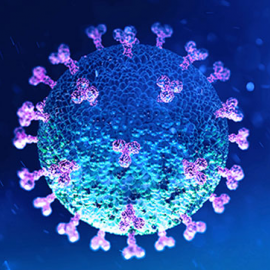A Viral Opportunity for Change
-
English
-
ListenPause
[intro music]
Welcome to World Ocean Radio…
I’m Peter Neill, director of the World Ocean Observatory.
The Coronavirus has produced global fear, isolation, and death, a tragic submersion into a world where Nature is perceived as our enemy, not our friend. We stay indoors, distanced even from family, and are obsessed with the effects of the disease on our health, safety, and community. This cannot be denied, no matter what our policies or our willingness to accept the studies and predictions of science.
Scientists, environmentalists, some politicians and economists have been predicting such global collapse for decades. The pervasive value of Nature, constantly challenged and corrupted over this period, has been diluted to a moment when spontaneous disease, generated in climate-degraded conditions has engendered a predictable expectation, a pandemic. Enough! The systems can take no more. We have abandoned any sense of reciprocity; we are prepared to consume everything Nature has to offer; and we are committed to giving nothing back but exhausted land and sea. It is a paradigm proven totally bankrupt.
Our helplessness in the face of the worldwide impacts of this event is palpable. The forces are irrational and deadly. Globalization accelerates contagion. The economic consequences are now terrifyingly real for a wholly integrated global economy: the cessation of manufacture, supply chain interruption, factories closed, workers confined, revenues lost, borders shut, internal exchange frozen, whole cities sequestered, and sudden uncertainty, even panic, in world markets reaching recession level or worse. The leaders who have either ignored or rationalized the outcomes of our past behavior have been already proven totally unprepared to guide us through the crisis. As a result of their lack of experience, awareness, and wisdom, they don’t know how.
Are we determined then to just hunker down, hoard supplies, and remove ourselves from human engagement? Do we convince ourselves that these actions are only a momentary pause in our progress toward return to what we were in the past? To the false reality of abundance that was ours for the taking without limit? In time, do we return to our lives of over-consumption and unsustainability? Should we not be looking at the causes of this viral experience?
To enact a climate defense and societal cure will require formidable transformational resilience and significant revolutionary responses. A massive collective initiative is required to confront a crisis outside our modern experience, the realization that without equally massive resistance and immediate transformational change, the world economy and all its social and political inter-connections will be overwhelmed.
We need to think about what we want on the other side of this crisis.
Is this not an astonishing opportunity for change? We have now experienced the destructive consequences of the past on a global scale; does not logic and practical need demand progress away from demonstrated failure toward new options and inventions for the future?
Should we not be thinking about and encouraging those opportunities now?
Should we not vow to transform our energy into a collective global effort toward a viable and sustainable world for our children? Is it finally time to awaken to save our selves from ourselves?
As we have advocated so often at the World Ocean Observatory, the ocean/freshwater continuum lies at the heart of this transformational shift away from unlimited growth, driven by consumption, enabled by fossil fuels, toward a new paradigm of managed growth, driven by sustainability, enabled by water, the most valuable natural resource on earth.
For more than ten years, through our online resources, the World Ocean Observatory has collected and circulated a consistent presentation of strategic actions to be taken as a means for the definition, organization, and implementation of this new world thinking. It is not a question of not knowing what to do, or how to do it, but rather a question of political will and massive social demand that these changes must be made.
We need to distill and define the priorities for what should be abandoned, what should be restored, and what should be invented as a new iteration of sustainable civil society. We already know many of these strategies: global biodiversity protections; new applications of capital; technical invention and management restructure; renewable energy production and distribution; improved sanitation systems, water-distribution, incentives for sustainable products and manufacturing processes; affirmation of ecosystem services analysis for all policy and planning: and other targeted innovations, legislation and inter-governmental agreements to advance public benefit, health and education, human rights, and social justice worldwide. In every case, there is technology and expertise available should we choose to apply it.
Consider this a viral opportunity. Not a threat—but a provocation to cure.
We will discuss these issues and more in future editions of World Ocean Radio.
[outro music]
We interrupt our Ocean Literacy Series to bring you a special episode related to the Covid19 global outbreak. This week on World Ocean Radio we confront the crises caused by the coronavirus. In this episode, host Peter Neill asks, "Is this not an astonishing opportunity for change? Does not logic and practical need demand progress away from demonstrated failure toward new options and inventions for the future? What kind of world do we want on the other side of this crisis?"
About World Ocean Radio
Peter Neill, Director of the World Ocean Observatory and host of World Ocean Radio, provides coverage of a broad spectrum of ocean issues from science and education to advocacy and exemplary projects. World Ocean Radio, a project of the World Ocean Observatory, is a weekly series of five-minute audio essays available for syndicated use at no cost by college and community radio stations worldwide.
- Login to post comments



